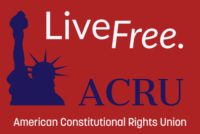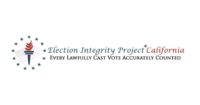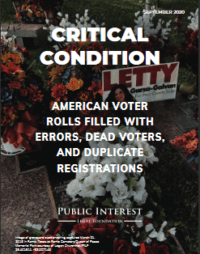The Importance of Accurate Voter Rolls
Any name on a voter registration roll can be voted —- either legally by the individual or illegally by someone else. Voter rolls are generally free to anyone who wants them, so with a bit of researching public documents they provide a virtual roadmap to vote fraudsters.
The most significant problem facing America’s electoral system is the chronic inaccuracy of county voter registration rolls. The situation leaves our voting process vulnerable to fraud, particularly through absentee and mail-in balloting.
Nearly a quarter century after the enactment of the National Voter Registration Act of 1993 (NVRA), a key element of the law —- to protect the integrity of the electoral processes and ensure accurate and current voter registration rolls —- has not been enforced. In fact, during the Obama administration, inaction was supplanted by actions to prevent jurisdictions from cleaning up their registration lists.
In our decentralized electoral system, voter registrations are maintained at the county level and a large and growing number of them do not maintain accurate voter rolls. Despite great advances in technology, most election officials fail to use the latest list maintenance tools and ignore emerging best practices such as inter- and intra-state data sharing.
According to a report by the Pew Charitable Trusts in 2012, approximately 24 million —- one of every eight —- voter registrations in the United States were no longer valid or were significantly inaccurate. More than 1.8 million deceased individuals were listed as voters and approximately 2.75 million people were registered in more than one state.
Increasing reports of noncitizens and other ineligible individuals voting are harming citizen confidence in the integrity of our election process.
The goal must be for candidates of all political parties to be confident that the winner and loser of a particular election are clear and that the election was conducted on a neutral field.
Keeping Voter Rolls Accurate and Up to Date
A modern election is complicated. It requires voter registration and voter roll maintenance for thousands, sometimes millions, of voters. Election officials must use and compare databases, consistently and regularly update information, implement procedures to ensure that all citizens can exercise the fundamental right to vote, and simultaneously take steps to avoid fraud and abuse. Finally, election officials must follow state and federal law, and oftentimes are constrained by technological issues or local public opinion.
Because of the complexity and importance of elections, any list maintenance system or program must include consistent and well-articulated policies and procedures. These are necessary for several reasons:
- to ensure equal and consistent treatment of all voters;
- to ensure the same steps are followed every time;
- to minimize human error and forgetfulness;
- to ensure consistency in the face of personnel turnover;
- and to enable election officials to examine policies and procedures to identify deficiencies and problems.
Any general program of list maintenance must include written or online training programs, written or online policies and procedures, and adequate recordkeeping and reporting to allow for later examination, analysis, or audit. They must:
- Develop written training materials for staff engaged in list maintenance activities.
- Develop written policies and procedures for list maintenance activities.
- Ensure that key office personnel, to include the supervisor of elections and the director of voter services, are familiar with the information and reports filed with the secretary of state regarding list maintenance activities.
The Voter Roll Toolbox
Federal law, the NVRA, requires county election supervisors to “conduct a general program that makes a reasonable effort to remove the names of ineligible voters from the official lists of eligible voters.”
No single list maintenance activity can reasonably address all the potential problems of inaccurate and incorrect voter registration data. However, there are a number of tools and reasonable procedures that county election officials should use to ensure the accuracy of their voter rolls. Among them:
Driver’s License Information
One of the most powerful tools available for obtaining accurate address information and removing duplicate voter registrations is driver’s license information. The comparison between these two state databases —- voter rolls and driver’s licenses —- is far and away the most powerful tool for cleaning and maintaining voter rolls.
The Department of Highway Safety and Motor Vehicles provides information through the Driver and Vehicle Information Database (DAVID) system, which is free for election supervisors to use.
Social Security Death Index
The most accurate way to ensure that deceased voters are removed from the rolls is by accessing the Social Security Death Index. These data are available on a monthly and cumulative basis and both types should be used. For deceased voters, voter rolls must be periodically compared to a cumulative index of deceased voters to remedy past errors and weed out attempts to register deceased voters.
Jury Notices
When called for jury duty, people will sometimes seek to recuse themselves because they no longer live in the jurisdiction or are not a citizen. Likewise, relatives or friends may inform the court that the person called for jury duty has died. This is all extremely valuable information to help maintain voter rolls. The information is a direct admission of ineligibility, or in the case of a deceased person, the information comes from a highly credible source. The state legislature and chief election official should establish a regular transfer of jury questionnaire data between the county and/or municipal court system and local election officials.
Voters Who Have Moved
We live in a very mobile society, so a prudent measure to assure voter roll accuracy is to use nonforwardable mailings sent to all registered voters in the county, both active and inactive, to identify registrants who may have moved.
The United States Postal Service (USPS) provides national change of address (NCOA) information to allow automated verification of addresses for registered voters. The NCOA database consists of change-of-address requests submitted by individuals to USPS when moving. A number of private companies also provide services to track address changes.
The NCOA database identifies the address change of voters and the election jurisdiction sends a forwardable confirmation notice. Regular use of the NCOA database throughout the year is arguably the best way to maintain voter rolls.
Election officials should send confirmation mailings if they have “reason to believe” or have received information “from any source” that indicates a voter has moved, such as statements on a jury declination form or other returned mail. If the voter fails to return the confirmation notice, the voter’s name should be placed on the inactive list.
The confirmation mailing is important, as federal law permits the voter to be removed from the voter registration list immediately if the voter confirms in writing a change of address outside the county.
Noncitizen Registrants
The Department of Homeland Security provides information to determine the citizenship status of registrants through the Systematic Alien Verification for Entitlements (SAVE) program.
Felons
The election supervisor should request or directly receive any information or communications from the U.S. Attorney or federal courts regarding felony convictions and regularly use them to remove convicted felons from the voter rolls.
Interstate Data Sharing
Interstate voter registration data exchange is an important step toward improving the accuracy of voter registration rolls. Unfortunately, some states do not participate and many state laws unnecessarily restrict the sharing of voter registration data with other state election officials.
Resources
- The has successfully sued countries to maintain accurate voter rolls. See ACRU LITIGATION.
- The tools and procedures listed above constitute the most basic elements of a general voter list maintenance program. More in-depth recommendations on list maintenance best practices can be found at https://publicinterestlegal.org/files/PILF-best-practices-report-FINAL.pdf.
ACTIVITY
Why We Black Leaders Support Voter ID Laws
America is a country of over 300 million people. We are comprised of every shape, size, nationality, and opinion. This diversity has proven to be one of our greatest strengths.However, if you listened to largely white liberal media personalities and elite CEOs, you wouldn’t know this. According to liberal orthodoxy, all Blacks think alike, and all Blacks support Black Lives Matter, and all Blacks oppose the recently enacted Georgia Election Integrity Act.
Trump Adviser Navarro: 6 Frauds ‘More Than Sufficient’ to Swing Election Outcome
White House trade adviser Peter Navarro issued a blistering 36-page report Thursday, in which he asserted that voter irregularities and election fraud have been found in "more than sufficient" quantities to swing the election to [...]
Is postal incompetence or deliberate malfeasance responsible for missing votes?
Sometimes ballots magically appear, and sometimes they magically disappear. According to hundreds of GOP voters in the Keystone State, they requested and returned mail ballots, but their votes are not registered on state databases. This was discovered by a small sampling by a vote integrity task force, leading us to wonder how many other missing votes remain missing.
Taking advantage of the homeless
Carlos Antonio De Bourbon Montenegro and Marcos Raul Arevalo of Los Angeles have been accused of requesting 8,000 ballots in the names of homeless people and setting up postal boxes to receive those ballots before completing and submitting them. This is what happens when a governor demands un-solicited ballots to be delivered wherever.
Oklahoma, where reform comes sweepin’ down the plain
State senators in Oklahoma are taking their oaths to protect the Constitution and their state citizens seriously and encouraging the U.S. Congress to do the same. The two Republican lawmakers have filed legislation that would [...]
ACRU: Vote Fraud in Nursing Homes is Real and Verifiable
American Constitutional Rights Union (ACRU) has provided affidavits to the Texas Attorney General as part of a request for a criminal investigation into alleged vote fraud committed against a resident with dementia in a Texas nursing home.
Social Worker Charged with 134 Felony Counts of Election Fraud
A Texas woman has been charged with 134 counts of election fraud after she allegedly acted to register nursing home residents, many of whom were mentally incapacitated, to vote in the 2020 election.
ACRU’s Protect Elderly Votes’ concerns about nursing home fraud confirmed
In a state where ballot harvesting is illegal, a remarkable coincidence occurred right before election day. According to reports from the Senate Judiciary Committee, 25,000 nursing home residents in different facilities across the state all requested ballots at the same time. Who ordered them? And more importantly, who filled them out? An investigation is currently ongoing.
California voter rolls used for unsolicited ballots are a complete mess
Since liberal Democrat California Governor Gavin Newsom unilaterally decreed that California would be an unsolicited mail ballot state, the state’s non-partisan watchdog, Election Integrity Project, has sent every notice possible short of carrier pigeon to the Governor and his Secretary of State sharing research that shows mail ballots will go to the moved, the deceased, those over 105 years old, with multiple ballots going to thousands of individuals. They tried again this week, and their findings are disturbing.
Groundbreaking National Voter Roll Study Reveals Alarming Trends as States Prepare to Vote by Mail
Our colleagues at PILF have performed an extensive nationwide study and found U.S. voter rolls are full of errors, deceased voters and duplicate registrations. They found nearly half a million problems -- how many remain undiscovered?



